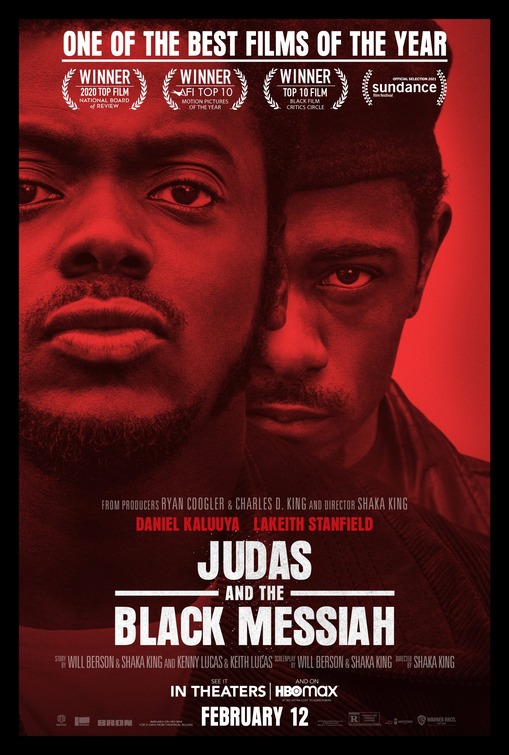
A 1968 memo issued within the FBI’s COINTELPRO operation once stated that one of their goals was to “Prevent the RISE OF A ‘MESSIAH’ who could unify … the militant black nationalist movement.” The messiah of this title is Fred Hampton (Daniel Kaluuya), chairman of the Black Panther Party chapter in Chicago. The Judas is William O’Neal (Lakeith Stanfield), a career criminal who had been masquerading as an FBI agent to steal cars because “a badge is scarier than a gun.” Genuine FBI operative Roy Mitchell (Jesse Plemons) must have admired his ingenuity. After Mitchell apprehends the thief for grand theft auto and impersonating an FBI agent, he makes O’Neal an offer he cannot refuse. In lieu of serving jail time, O’Neal is extended an opportunity to infiltrate the Black Panthers and become an informant by reporting on their activities. He accepts.
There’s an interesting dichotomy at work here. Director Shaka King seeks to recontextualize the historical depiction of this Black Power organization by the US government. There was the political party created in 1966 by Huey Newton and Bobby Seale that was a heavily armed group that relied on open-carry laws to launch neighborhood police patrols. The FBI considered them an ultra left-wing institution. This led to their designation as a “Black-nationalist hate group.” Then there’s the record presented here that portrays them as a hub of free social programs for the community. There’s breakfasts for children, health care clinics, and legal aid — all for people in need. Those activities makes them sound like they’re competing with Mother Theresa. Nevertheless, King doesn’t shy away from some of Fred Hampton’s more polemical speeches. In one intense moment, Hampton urges an audience “Kill a few pigs, get a little satisfaction. Kill some more pigs, get some more satisfaction. Kill ’em all and get complete satisfaction!”
Judas and the Black Messiah is an incredible fable anchored by two compelling performances. The one that first seizes focus and screams “Give me an Oscar!” comes from Daniel Kaluuya. That’s not to disparage his performance. He is bursting with fiery charisma as Fred Hampton. The black leader is such an incendiary presence that it is impossible not to take notice. It’s wholly believable that people would follow this man. His oratory skills are superlative when addressing a marginalized crowd, already disaffected by police brutality. He is the quintessential “angry young man” but he alternatively displays compassion and tenderness when interacting individually with people, particularly fellow member Deborah Johnson (Dominique Fishback) who would become his girlfriend. The picture successfully humanizes him as an individual.
What lingers in the mind well after you’ve finished watching is the life of one William O’Neal. Given this is a drama that is ostensibly about Fred Hampton, that U-turn is perhaps the most unexpected cinematic surprise of 2021 thus far. Some may label O’Neal, “the villain”. This is a lot more complex than that. The film handles his existence with humanity. Actor Lakeith Stanfield imbues the man with a benevolence that presents him like the heartbreaking figure in some Shakespearean tragedy. He emerges as the spotlight as well as a personality that bookends the chronicle. Portions of actual interviews with William O’Neal from the second part of the acclaimed documentary Eyes on the Prize, are included here. I would highly recommend you seek this documentary out if you are even remotely intrigued by what you see here.
If Daniel Kaluuya is the soul, then Lakeith Stanfield is the heart. You’d assume a messiah would be more important than Judas. I find it surprising that an account that has been largely promoted to be about Fred Hampton, ultimately evolves into a chronicle of his betrayer. When (yeah not IF but WHEN) Daniel Kaluuya gets an Oscar nomination for Best SUPPORTING Actor, it will highlight this fact as further proof. O’Neal’s life is indeed astonishing for the way he must come to terms with and then justify what he is doing. He is conflicted. Agent Roy Mitchell as Bill’s handler isn’t all bad either. He is shocked — at least initially — by some of the FBI’s lawless methods which include outright murder in the line of duty. As the saga unfolds Mitchell becomes far less sympathetic. The one element that is not nuanced is that of J Edgar Hoover (Martin Sheen) performing under (what I hope is) pounds of pancake makeup applied to his pockmarked face . He is the clear-cut, hissable villain. Hoover is an absolute monster here that makes all previous incarnations of him seem saintly by comparison.
I’ll end my review with how the movie begins. Director King introduces his creation with the title card “Inspired by true events.” These disclaimers always irk me. They come across as carte blanche to make stuff up. Granted most, if not all, movies must use a certain amount of creative license. There are too many conversations where few people were actually in the room. There’s also the filmmaker’s point of view. That’s entirely fair. Whenever I see those ubiquitous retractions, it just makes me want to read up on the actual history. That is — when I am intrigued enough — and trust that these events are uniquely disturbing. Obviously, I am a film critic, not a historian so I am not here to fact-check the narrative. I am going to assess the entertainment value of the picture. King worked with screenwriter Will Berson and comedians Kenny and Keith Lucas to pen a tale that I found fascinating. In an interview, Kenny and Keith Lucas pitched the idea of a Fred Hampton biopic as “The Conformist meets The Departed.” That’s such a perfect description, I simply had to quote it. Similarly, Judas And The Black Messiah is a taut and exciting 1960s period thriller that compares favorably with those classics.
02-12-21
Leave a comment